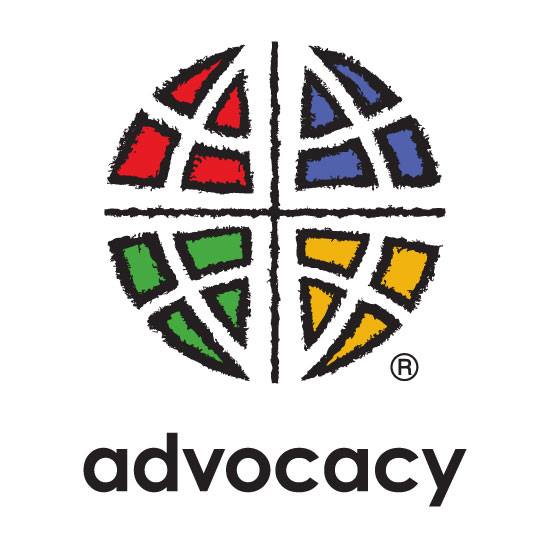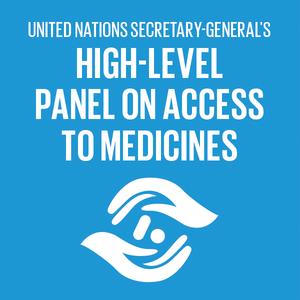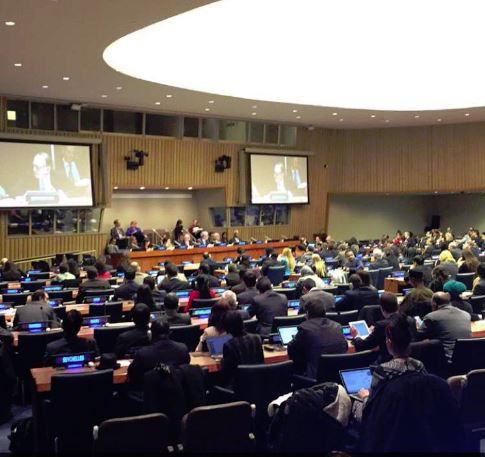Today, we
present our ELCA Advocacy Update for the month of February, and a preview of some of our advocacy priorities for 2016!
Please read below for important information on ELCA Advocacy efforts in
Washington, across the country and throughout the world. To read the full
version of the update and for more information on advocacy efforts from our
Lutheran State Advocacy offices, visit our blog!
Advocacy
Update - February 2016
ELCA Advocacy, Washington D.C.
 2016
ADVOCACY PRIORITIES: Now
that lawmakers have planned their legislative agenda for 2016, ELCA Advocacy is
excited to share our policy priorities for this fast-paced election year. We continue
to strive for public policies that embody the biblical values of peacemaking, hospitality
to our neighbors, care for creation, and concern for our brothers and sisters
facing poverty and struggling with hunger and disease. In this election year, Members of Congress will want to pass legislation quickly and early to return to their districts in the summer to campaign with tangible policy results. Check out an overview our 2016 Advocacy priorities.
2016
ADVOCACY PRIORITIES: Now
that lawmakers have planned their legislative agenda for 2016, ELCA Advocacy is
excited to share our policy priorities for this fast-paced election year. We continue
to strive for public policies that embody the biblical values of peacemaking, hospitality
to our neighbors, care for creation, and concern for our brothers and sisters
facing poverty and struggling with hunger and disease. In this election year, Members of Congress will want to pass legislation quickly and early to return to their districts in the summer to campaign with tangible policy results. Check out an overview our 2016 Advocacy priorities.
#ELCAvotes:
We are
called to conversation and prayer around our role as U.S. residents and as
people of faith in ensuring our election systems promote dignity and respect
for all. We are called to act by speaking out as advocates and engaging in
local efforts to guarantee the right to vote to all citizens.
ELCA Votes is an initiative created in collaboration with ELCA Racial Justice Ministry, ELCA Young Adult Ministry,
Lutheran Advocacy offices, and synods throughout the country. This is an
initiative to:
- Expand
the role of the church in encouraging faithful and non-partisan voter
participation;
- Provide
a framework for all Lutherans to understand and speak out about the
intersection between voting and elections, and racial and economic justice;
- Provide
young adults the tools to understand and speak about what it means to be a
young person of faith who is civically engaged; and
- Engage
with and equip ethnic specific communities to talk about voting rights and
race, and their connection with elections today.
Sign up to join this effort!
Find out how you can get involved and share what you are already doing locally!
DHS
RAIDS: In January, the Department of
Homeland Security (DHS) began operations to track and deport Central American
families that arrived in the U.S. after Jan. 1, 2014. As a church with faith
partners that work directly with deported children and families in El Salvador
and Honduras, we know that deportation does not deter children and families
from leaving their communities. We join Lutheran Immigration and Refugee
Service (LIRS) in our concern
for ensuring access to justice in the U.S. for these families
who must navigate a complex legal system, often without necessary support. Read
more on the ELCA Advocacy Blog.
JUSTICE
FOR FLINT, MICH.: Many
residents in Flint, Michigan are unable to access safe water to drink, do their laundry, wash their dishes, or
bathe.
Lutheran congregations, volunteers, and local leaders are now working in Flint to
help provide clean water for those in need. As ELCA World Hunger
prepares to fund relief efforts, federal funding is critical to replace Flint’s
toxic water pipes. Urge members of Congress to provide this funding by clicking here and find out more about Lutheran
engagement at the Southeast Michigan Synod page.
Lutheran Office for World Community, New York,
N.Y.
 IMPACT OF
INTERNATIONAL PATENT ARRANGEMENTS: In July 2012 the Global
Commission on HIV and the Law published the report
“Risks, Rights and Health,” which outlines, among many issues, the gap in
medical treatment as a result of bilateral and multilateral trade agreements.
Evaluating the effects of the increased power of pharmaceutical patent holders,
this report notes that by the end of 2010, 77 percent of medically eligible
children in low- and middle-income countries were not receiving antiretroviral
therapy for HIV and AIDS.
IMPACT OF
INTERNATIONAL PATENT ARRANGEMENTS: In July 2012 the Global
Commission on HIV and the Law published the report
“Risks, Rights and Health,” which outlines, among many issues, the gap in
medical treatment as a result of bilateral and multilateral trade agreements.
Evaluating the effects of the increased power of pharmaceutical patent holders,
this report notes that by the end of 2010, 77 percent of medically eligible
children in low- and middle-income countries were not receiving antiretroviral
therapy for HIV and AIDS.
On Thursday, Jan. 14,
Christine Mangale and Nicholas Jaech of the Lutheran Office for World Community
(LOWC) participated in an international webinar regarding the timeline and
goals of the High-Level
Panel on Access to Medicines, a
group appointed by U.N. Secretary-General Ban Ki-moon in November 2015. Within
the realm of health technologies, this panel is addressing the current policy
incoherence among the rights of inventors, trade laws, public health and human
rights law. There is also an Expert Advisory Group, comprised
of U.N. agencies and organizations, the public and private sector, and civil
society. In March 2016, two global dialogues will be hosted (London, March 9-10;
Johannesburg March 16-17) to provide key stakeholders the opportunity to
provide their thoughts, ideas and inputs to the panel. There will be an
official report to the U.N. secretary-general on global access to medicines,
estimated by June so it is available for meeting on HIV and AIDS later that
month.
THE HUMAN RIGHTS UP-FRONT INITATIVE: On
Wednesday, Jan. 27, LOWC attended a briefing by the U.N. deputy secretary-general
on the Human
Rights Up Front Initiative. Launched in 2013, the initiative hopes
to guarantee early and effective action on behalf of the U.N. system to prevent
or respond to “large-scale violations of human rights or international
humanitarian law.” The deputy secretary-general called for a “cultural change”
of the United Nations to make sure that the staff understand effective
prevention tactics – as well as an “operational change” – shared information
between development, humanitarian and human rights agencies and organizations.
The deputy secretary-general also called for further engagement with member states,
encouraging them to adopt aspects of the initiative into their own national and
foreign policies. While most member states that spoke during the briefing
outlined their support for the initiative, some members had reservations about
what they described as an encroachment of U.N. initiatives into national
policies, especially concerning human rights.
 FOLLOW-UP
AND REVIEW OF SUSTAINBLE DEVELOPMENT GOALS:
On
Thursday, Jan. 21, U.N. Secretary-General Ban Ki-moon released a report on
the global follow-up and review of the 2030 Agenda for Sustainable Development,
which includes the 17 Sustainable Development Goals (SDG). Most importantly,
this report highlights ways to “fully use the potential” of the next meeting of
the High-Level
Political Forum on Sustainable Development, scheduled for July
11-20. This report suggests four parts to the forum: a review of the progress
in achieving the SDG, including voluntary national reviews by member states; a
specific review of Goal
17,
as well as other global partnership agreements, thematic reviews and emerging
issues. The report also outlines two potential frameworks for SDG evaluation at
all forums on sustainable development convened over the next 15 years. The
first is a comprehensive review of all 17 goals to be completed within one
year. The second option allows for a comprehensive review but also an in-depth
review of each goal, covering all 17 goals within a four-year timespan.
According to both options, however, Goal 17 will be evaluated each year.
FOLLOW-UP
AND REVIEW OF SUSTAINBLE DEVELOPMENT GOALS:
On
Thursday, Jan. 21, U.N. Secretary-General Ban Ki-moon released a report on
the global follow-up and review of the 2030 Agenda for Sustainable Development,
which includes the 17 Sustainable Development Goals (SDG). Most importantly,
this report highlights ways to “fully use the potential” of the next meeting of
the High-Level
Political Forum on Sustainable Development, scheduled for July
11-20. This report suggests four parts to the forum: a review of the progress
in achieving the SDG, including voluntary national reviews by member states; a
specific review of Goal
17,
as well as other global partnership agreements, thematic reviews and emerging
issues. The report also outlines two potential frameworks for SDG evaluation at
all forums on sustainable development convened over the next 15 years. The
first is a comprehensive review of all 17 goals to be completed within one
year. The second option allows for a comprehensive review but also an in-depth
review of each goal, covering all 17 goals within a four-year timespan.
According to both options, however, Goal 17 will be evaluated each year.
Lutheran state advocacy efforts across the
country
Find out all about the
vast and incredibly important work of Lutheran advocates across the country by
visiting our ELCA Advocacy Blog.
(To view this email in web format, click here.)
